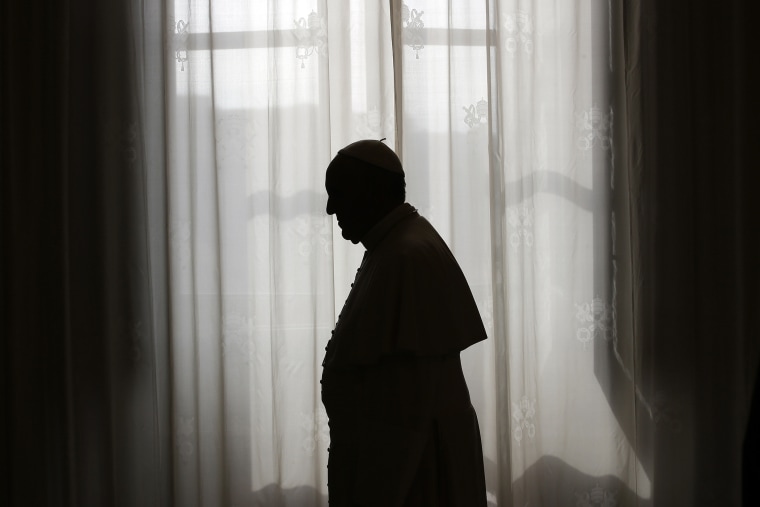Dangerous, manmade global warming is established science, as undeniable as the clicked-on flame from a hot stove. But after Pope Francis declared as much in a papal letter on Thursday, calling for a “cultural revolution” to save the earth, the rationale for actually responding to climate change faced new attacks.
Republican consultant Michael McKenna set the political tone, telling The New York Times that the pope was “selling a line of Latin American-style socialism,” while — in earlier comments — GOP presidential contenders Jeb Rush and Rick Santorum hammered the church’s scientific credibility.
RELATED: Pope Francis rejects communism critique
Those who deny the reality or risk of climate change are dead wrong, according to Paul N. Edwards, a professor of information at the University of Michigan. Edwards is the author of a definitive book on the creation of global climate models and, in a recent debunking interview with NBC News, he untangled the intentional misinformation out there about our warming planet.
No, global warming is not all based on simulations.
It’s “founded on hard data,” Edwards said, referring to 1.6 billion temperature records taken from over 39,000 weather stations. Numerous independent studies of that data show that each of the last three decades have been hotter than the last, he added.
No, global warming has not stopped.
“It’s true that the rise in surface temperature has slowed a bit, but our greenhouse gases go on trapping heat, and that heat is showing up in the oceans,” Edwards said. To wit: The last decade was the hottest on record, and each of the last three decades was hotter than the one before it.
No, global warming will not be great.
It might open up the poles to shipping. It might bump up agriculture yields in some parts of the world. “It will also bring massive drought, rising sea levels, murderous heat waves, and ecological catastrophes,” Edwards said. “If we don’t act now, we’ll be outside the safe zone by mid-century.”
RELATED: The pope’s five most important environmental arguments
Rather than break their lance against solid science, however, some opponents of the pope have adopted a pious tone of their own, attempting to derail his Holiness in the realm of ethics and morality.
“The Left appears to be quite willing to harm the world’s poor in developed and emerging countries to advance their green agenda,” Gene Koprowski, marketing director of the conservative Heartland Institute said in a statement to msnbc. “We think that is morally wrong.”
In the run-up to the pope’s letter, members of the Heartland Institute traveled to Rome for a “pre-rebuttal,” denying the scientific reality of dangerous climate change. In the days and months ahead, Koprowski said, the Chicago-based think tank will continue that campaign under a more faith-based, social and religious banner.
The man who will carry it is Dr. Calvin Beisner, a Heartland adviser and veteran of the global warming wars of the second Bush era.
In the middle of the last decade, you may recall, scores of evangelical leaders embraced a doctrine of “creation care.” It used scripture as a basis for policies to combat global warming. “We are convinced that evangelicals must engage this issue without any further lingering over the basic reality of the problem or humanity’s responsibility to address it,” hundreds of pastors wrote in a 2006 statement.
The movement peaked, perhaps, with a 2008 commercial featuring the Revs. Pat Robertson and Al Sharpton. Sitting on a love seat together, they claimed to agree on nothing except the vital protection of “our planet.”
There are many reasons the creation care message disintegrated from there. A deep recession made anything but the economy feel abstract and irrelevant. From within the evangelical movement, however, Beisner swung the heaviest hammer. He rebutted his evangelical brothers and sisters point by point. Now 60, and winner of the Heartland Institute’s 2014 “Outstanding Spokesperson on Faith, Science, and Stewardship Award,” he’s back at it with much the same playbook and more reach than ever.
RELATED: Martin O’Malley calls for 100% clean energy by 2050
Earlier this spring he was selected to publicly debate Bill Mckibben on stage at the New Orleans Baptist Theological Seminary, one of the country’s largest. Mckibben himself has recognized Beisner’s gathering power. In a 2013 essay for Sojourners magazine, the father of the modern environmental movement called Beisner and his flock “the premier faith-based climate-change-denial operation on the planet.”
Beisner’s private organization is called the Cornwall Alliance for the Stewardship of Creation. Until recently, it was best known for a 2010 lecture series called “Resisting the Green Dragon.” Now on video, the popular talks — including appearances by Tony Perkins, president of the Family Research Council and Tom Minnery, senior vice president of Focus on the Family — equate environmentalism with an evil serpent. They warn Christians about a radical green agenda that is “seducing our children,” and “striving to put America, and the world, under its destructive control.”
So now that this slimy jade trail has led all the way to the Vatican, what does Beisner have planned? How will he exorcize the demon? In an e-mailed response to questions from msnbc, Beisner pointed only to a new "Open Letter to Pope Francis.” The document argues that what the poor need is not a reduction in the use of fossil fuels, but as vast expansion. It has been signed now “by nearly 200 scientists, economists, theologians, and others with expertise on climate change and climate-and-energy policy,” Beisner claimed.
The pope has not responded.
